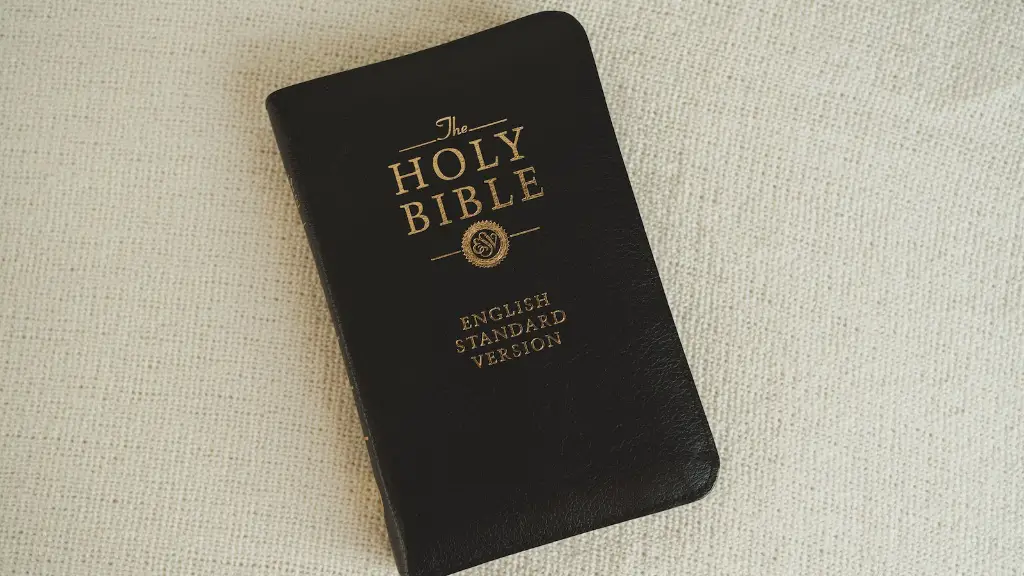What Does the Bible Say?
Animals in the Bible, particularly pets such as dogs and cats, are usually viewed as part of God’s creation. This often leads to the question of whether or not animals will go to Heaven. The Bible does not explicitly say one way or another. However, there are passages that suggest animals are welcomed in Heaven and will enjoy life there.
In the New Testament, Jesus mentioned the Kingdom of Heaven, saying it’s vastness is far greater than that of the Earth. Matthew 6:26 states, “Look at the birds of the air; they do not sow or reap or store away in barns and yet your Heavenly Father feeds them.” This verse is often interpreted to indicate that God will provide for animals in Heaven.
The concept of the afterlife for animals is also seen in the Book of Revelations. In the Bible, Heaven is known as the “New Earth.” In this New Earth, animals are free to roam and they have the same natural obstacles they have in the wilderness on Earth. Isaiah 11:6 says, “The wolf will live with the lamb, the leopard will lie down with the goat, the calf and the lion and the yearling together; and a little child will lead them.” This passage is often studied to illustrate the idea that animals will dwell peacefully in Heaven.
There are those who believe animals will go to Heaven. Some Christian denominations say the Bible provides sufficient evidence. Others believe that since animals do not have a spirit, they will not go to Heaven. It is possible to be a believer in Jesus and think that animals are just a part of the Earth, not eternal souls. It is also possible to be a believer in Jesus and think that animals, like humans, will have a place in the afterlife.
There is still much debate among theologians and spiritual leaders about this topic. Regardless of the interpretation, one thing remains the same. Thanking the Lord for His blessings on Earth-including the animals-is the right thing to do.
Does The Bible Support Animal Rights?
The Bible supports the idea of animal rights, with some passages in the Old Testament specifically declaring this. For example, Psalm 104:14-15 states, “He makes grass grow for the cattle, and plants for man to cultivate— bringing forth food from the earth: wine that gladdens the heart of man, oil to make his face shine, and bread which strengthens man’s heart.” Here, God is described as caring for both humans and animals.
In Genesis, the Garden of Eden is described as having been given to Adam and Eve to live in, to look after, and to take care of all the animals. In Proverbs 12:10, it states that “A righteous man cares for the needs of his animal”. This indicates that part of being righteous is to care for the needs of animals. This same idea can be found in Isaiah 11:6-9, which states that animals will live peacefully together in Heaven. This is a clear indication that God cares for animals, and their rights should be respected.
The Bible also reaffirms that humans have an obligation to protect and care for animals. In Genesis 1:26, it states, “And God said, Let us make man in our image, after our likeness: and let them have dominion over the fish of the sea, and over the fowl of the air, and over the cattle, and over all the earth, and over every creeping thing that creepeth upon the earth.” In this passage, God gives humans responsibility over animals, thus requiring us to take care of them.
The Bible also indicates that animals should not be abused or mistreated in any way. In Exodus 20:12-17it states “You shall not steal, You shall not covet…And whatever man does to the animals, he must pay back fourfold.” This indicates that animals should be respected, and mistreating them will be punished accordingly.
Does Death Bring an End to Animals?
The Bible does not provide a clear answer as to whether or not animals have immortal souls. Some passages in the scripture, such as Ecclesiastes 3:21, strongly suggest that animals and humans are equal, but death brings an end for all.
On the other hand, some religious traditions believe that animals have a soul, and may go to another plane of existence after death. In this context, animals may be described as existing in an eternal plane where their soul continuously moves on and evolves.
Christian philosopher C.S. Lewis argued in his book, The Problem of Pain, that animals could have immortal souls. He pointed to the fact that animals do possess some sense of sentience, and therefore may possess a soul as well. Lewis further argued that animals have free will, so they should be judged as humans, and could even reach a higher plane of existence than humans.
These ideas have provided debate among theologians for centuries. Despite the uncertainty, one thing is for sure that, in Christianity, the proper treatment of all creation is taught, so animals should be treated with compassion and respect.
Conclusion
In conclusion, The Bible does not explicitly state whether animals will go to Heaven or not. However, there are passages that suggest animals are welcomed in Heaven and will enjoy life there. The Bible does also directly support the idea of animal rights, and that we have an obligation to protect and take care of all animals. Death brings an end for all, including animals, but some religious traditions believe that animals have a soul and may go to another plane of existence after death. Even if we do not have complete certainty over whether animals would go to Heaven, one thing is sure, caring and respectful treatment is what we should afford to them.
Animals in Art and Mythology
Animals have been a common theme in art, mythology and religion for centuries. From the winged horses of Greek mythology to the fierce dragons of Chinese culture, animals have held a special place in our imagination. Even in Christianity, there are several stories of animals in the Bible, such as the lion that the Prophet Daniel faced, the sheep of the parable of the Prodical son, and the many animals featured in the Book of Revelation.
The representation of animals in art and mythology often serves as a point of reflection for how we view animals in our lives. It can bring us deeper into understanding who they are, how they live and the roles they play in society. Images of animals, for instance, can evoke wonder and awe, a reminder of the innate beauty and power of nature.
Mythology has also provided a deep symbolic meaning behind animals, very often associating them with good luck. The swan, for example, is often seen as a symbol of grace and beauty. The dove is seen as a symbol of peace and hope, while the lion stands for strength, courage and ferocity.
Through the works of art, literature and mythology, animals take on a special importance in our lives. They touch us in ways that words alone cannot express, and in doing so, remind us of our place in nature.
Animals in Religion
Animals play a special role in religion, often being seen as messengers of God or symbols of divine forces. In many religions, such as Hinduism, Buddhism, and Christianity, animals are often seen as embodiments of gods or goddesses.
Animals are also seen as messengers of God, often carrying messages or tasks for humans. In Christianity, for example, a dove is seen as a representation of the Holy Spirit, the messenger of God. In Hinduism, the cow is seen as a representation of abundance and generosity, and its presence is seen as a divine blessing.
Many religions also prescribe certain rules and regulations regarding animals. In Islam, for example, there are certain rules regarding the humane treatment of animals, such as forbidding cruelty towards them. In Judaism, animals are seen as part of God’s creation and must be cared for and respected.
Animals play a powerful role in religion, representing divine forces, gods, and messengers. Through religion, animals are provided with a special status and are seen as part of God’s divine plan.
Animal Ethics
Animal ethics is the study of the moral status of animals, and how humans should interact with them. Animal ethics is based on the idea that animals are sentient creatures, capable of feeling pain and suffering, and should be afforded the same respect and consideration as humans.
The concept of animal ethics is largely based on the ethical claim that animals have certain rights, such as the right to freedom, to live a life free of suffering, and to receive humane treatment. It is argued that as animals are sentient, they deserve to be treated with respect and compassion, just as humans do.
Animal ethics is a growing field of study, and is becoming increasingly important in light of stories of animal abuse and animal exploitation. Animal welfare organizations are campaigning for greater recognition of the rights of animals, and for the introduction of laws that protect the lives and welfare of animals.
Animal ethics provide a framework for how humans should interact with animals, emphasizing that animals should be afforded the same respect and consideration as humans. Animal rights activists and groups continue to raise awareness on animal ethics, advocating for better treatment of animals, as well as for greater protection of animal rights.





